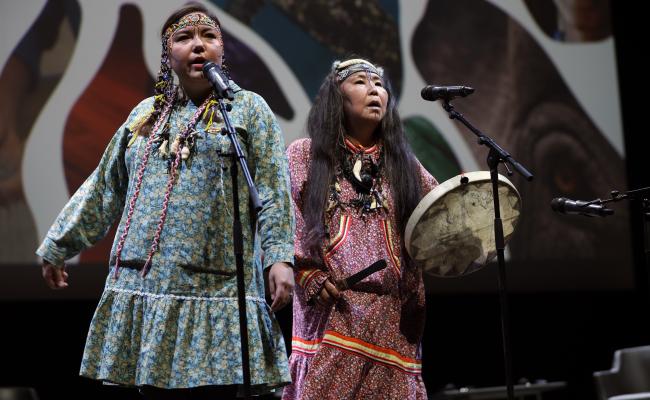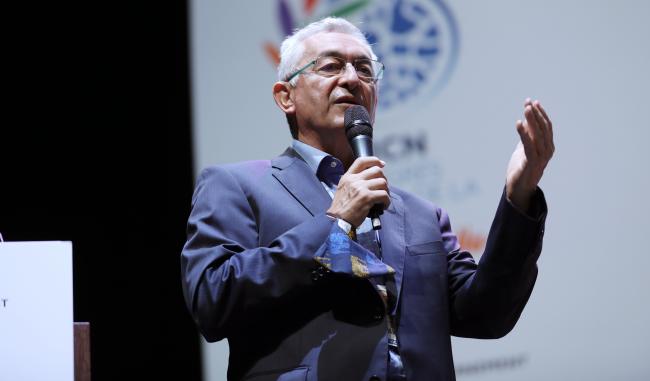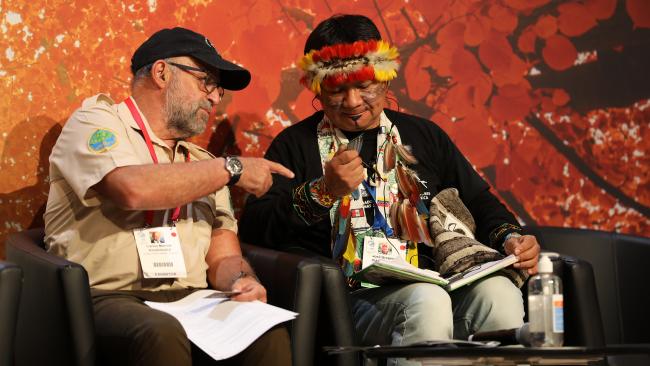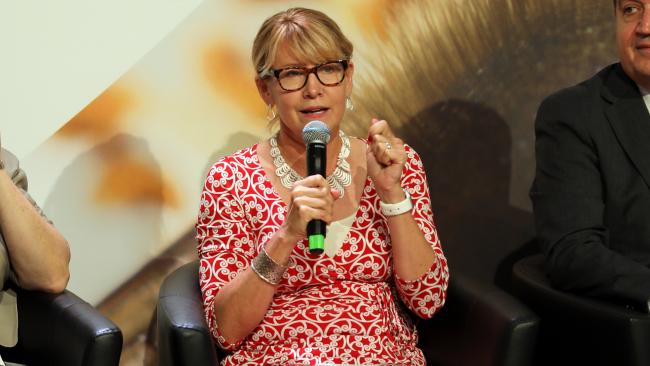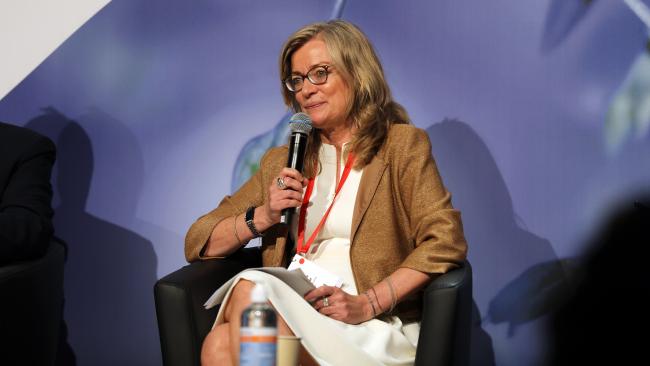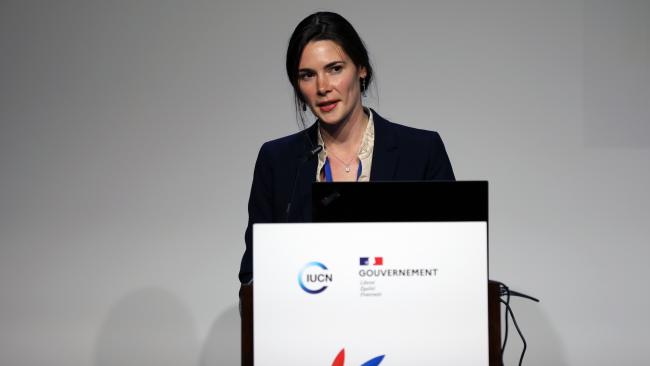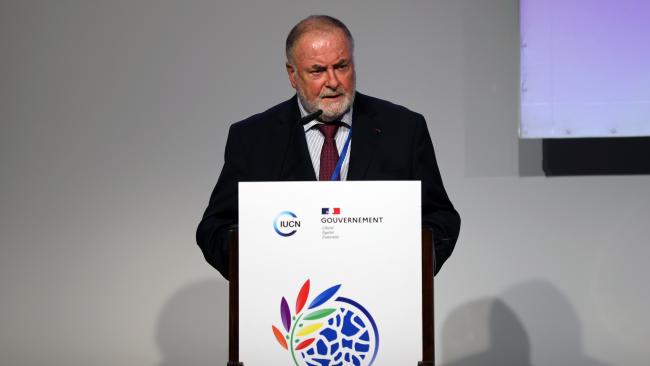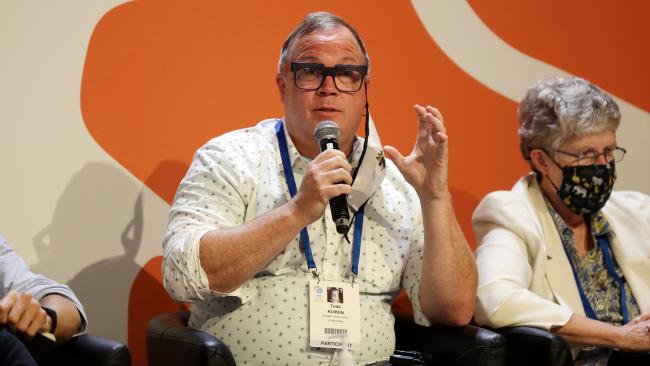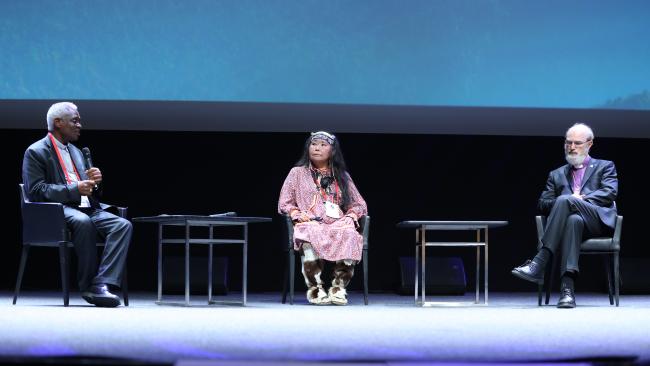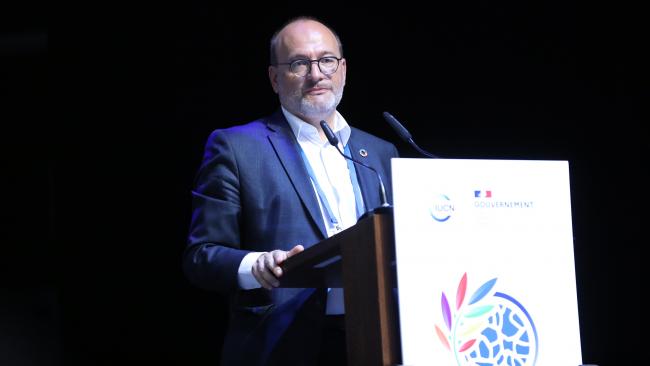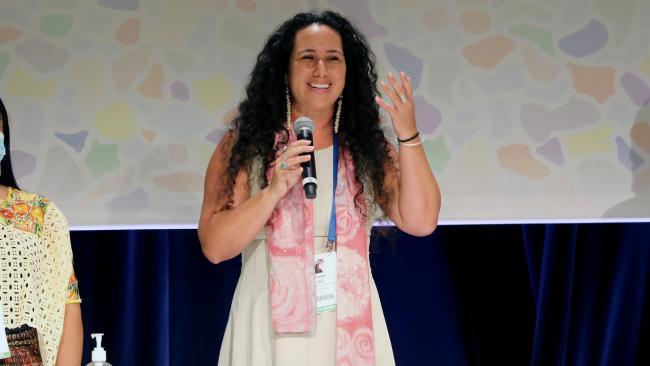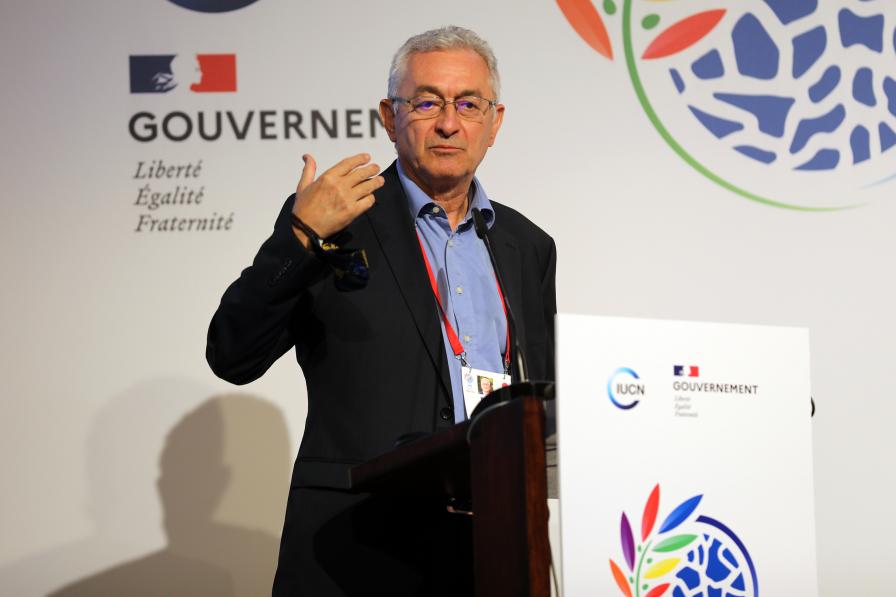The International Union for the Conservation of Nature (IUCN) World Conservation Congress (WCC), continued its work on Saturday, with a plethora of Forum events. The Forum includes more than 600 sessions on the economic, social, scientific, and technical aspects of issues covering the thematic areas of the Congress, ranging from high-level dialogues to training and capacity-building sessions, as well as exhibitions and social events.
Forum Opening
In the morning, during the Forum Opening, IUCN Director General Bruno Oberle noted that the pandemic has revealed our interrelation with nature, which is “our biggest infrastructure.” Barbara Pompili, Minister of the Ecological Transition, France, called for decarbonization, stressing this transition is not about restrictions, but about drivers and opportunities.
Frans Timmermans, European Commission, noted that humanity has an incredible opportunity for a fundamental reset, cautioning that if the transition is not successful, future generations “will be fighting wars over water and food.” Ana María Hernández Salgar, Chair, Intergovernmental Science-Policy Platform on Biodiversity and Ecosystem Services (IPBES), reiterated the linkages among biodiversity, climate change, and health, calling for mainstreaming biodiversity considerations in all sectors.
Christine Lagarde, President, European Central Bank, emphasized the need to eliminate fossil fuel subsidies and set a carbon price. Nisreen Elsaim, UN Youth Advisory Group on Climate Change, underscored knowledge dissemination as the first step in developing the solidarity necessary to address the environmental crisis. Yannick Glemarec, Executive Director, Green Climate Fund (GCF), agreed that greening the economic recovery is essential and emphasized that developing countries need access to green finance.
The Forum Opening set the overall agenda for discussions across the seven Congress themes: landscapes; freshwater; oceans; climate change; rights and governance; economic and financial systems; and knowledge, innovation, and technology.
Opening Plenary: Mobilising Nature and Society to Address the Climate Emergency – Setting the Stage
Barbara Pompili, Minister of the Ecological Transition, France, said “nature is a climate ally, not a passive receptacle of policies.” On COP 26, Patricia Espinosa, Executive Secretary, UNFCCC, called for mobilizing biodiversity-neutral or -positive investment for climate action. Laurent Fabius, COP 21 president, said COP 26 must implement and strengthen, not reinvent, the Paris Agreement. Nigel Topping, UN High-Level Champion for Climate Action, UK, urged turning ambition into action that is informed by science.
Opening Plenary: A Dynamic Ocean
During a panel discussion, speakers presented new tools: the Global Fishing Index and the Marine Manager, which will assess fish stocks globally and track fishing activities via satellite, respectively. Panelists emphasized that better, more accessible data is needed to move fisheries in a sustainable direction. They added that local knowledge from all practitioners must be included in these tools and assessments, as well as more innovative financing to promote sustainable fisheries management, for example through grants, blended finance mechanisms, and increased risk disclosure.
Opening Plenary: Advancing Rights and Inclusive Governance in Conservation
Carlos Manuel Rodriguez, CEO and Chairperson, Global Environment Facility (GEF), stressed the need to: fully recognize Indigenous Peoples as political actors; invest heavily in good governance at the national level; and address institutional failures. José Gregorio Díaz Mirabal, Coordinator of Indigenous Organizations of the Amazon River Basin (COICA), highlighted the motion to protect 80% of the Amazon by 2025, encouraging respect for Indigenous Peoples’ political and territorial rights.
Opening Plenary: Realigning Economy and Conservation - Towards a Systemic Change in Economics and Finance
Marianne Haahr, Green Digital Finance Alliance, moderated. Bruno Oberle, Director General, IUCN, emphasized enormous opportunities, potentially arising from transforming the industrial sector, which could equal a Marshall Plan times 100.
Lamenting a biosphere stressed beyond imagination, Partha Dasgupta, University of Cambridge, UK, urged companies to disclose risks throughout supply chains to enable consumers to make informed decisions.
Two panel discussions focused on nature-based economic recovery and triggers for action.
Opening Plenary: Demands and Dilemmas at the Landscape Scale
Christiane Laibach, Executive Board, KfW Development Bank, called for more private sector financing to address ecosystem degradation, and ensuring this financing reaches the developing world. Achim Steiner, Administrator, UN Development Programme (UNDP), said conservation and human growth can be achieved, and that land use is a good indicator of an economy’s ability to bring people and nature together.
Opening Plenary: Standards and Applications - Knowledge Guiding Policy and Practice?
Craig Hilton-Taylor, IUCN, and Emily Nicholson, Deakin University, Australia, presented on the IUCN Red List and the IUCN Red List of Ecosystems, respectively.
Andy Plumptre, Head, KBA Secretariat, BirdLife International, stated that the need for a unifying framework to investigate sites of importance to biodiversity led to the designation of Key Biodiversity Areas (KBA). Lauren Weatherdon, UNEP-World Conservation Monitoring Centre, spoke on the Protected Planet initiative, which is an aggregation of local and national databases. Edward Ellis, Integrated Biodiversity Assessment Tool (IBAT), provided an overview of the IBAT and its application.
Opening Plenary: Our Freshwater Global Risk - Taking Actions to Reverse the Trend
Loïc Fauchon, President, World Water Council, observed that water is at the center of nature-based solutions, although it is often not prioritized as such.
Bérangère Abba, Secretary of State for Biodiversity, France, highlighted national efforts to restore and purify water resources, including master plans for water development and management.
Elizabeth Mrema, Executive Secretary, CBD, highlighted threats to fresh water, noting that management of water systems has focused on water provision for domestic use without ensuring the integrity of water functions.
Martha Rojas Urrego, Secretary-General, Ramsar Convention, described wetlands as the most effective carbon sink, critical for water purification and recharge, as well as for other development objectives.
Update to the IUCN Red List
Bruno Oberle, Director General, IUCN, said the newest assessment brings hope, using as an example, evidence showing that some tuna populations are slowly recovering.
Jane Smart, IUCN, said nature is in trouble, emphasizing the need for good intelligence and information based on sound science to address the problem, which is the purpose of the IUCN Red List. Beth Polidoro, Arizona State University, said the decline in the loss of tuna shows that sustainable fishing is possible.
Genetic Frontiers for Conservation
This session, facilitated by Julie Shapiro, Keystone Policy Center, focused on synthetic biology. In 2016, IUCN’s Members requested an assessment on applications of synthetic biology, relevant to the conservation and sustainable use of biodiversity. Many members of the IUCN Task Force on Synthetic Biology and Biodiversity Conservation participated in this session.
Discussions focused on: weighing potential risks and benefits; past lessons learned from technological development; prioritizing traditional conservation techniques before applying novel technologies; and whether a governance mechanism could potentially stop synthetic biology applications.
The Spirituality and Nature Dialogue: Responsibility, Inspiration and Vehaviour change
Cardinal Peter Turkson, First Prefect, Vatican, said humanity has gone wrong in trying to control and dominate the Earth, rather than conserving and protecting it to ensure it can continue to support human life. Olga Letykai-Csonka, Ethnologist, said all nature is animated and alive, and stressed the need to live spiritually in harmony with nature. Noting the majority of the world’s population is spiritual or religious, Thomas Schirrmacher, Secretary General and CEO, World Evangelical Alliance, said the required societal change needs spiritual and religious backing, promoting the understanding that protecting nature is part of faith.
Unlocking a Nature-based Recovery: how to rebuild after the pandemic
Bruno Oberle, IUCN, called for investments that do not worsen the biodiversity crisis and that earmark at least 10% to benefit nature directly. Rémy Rioux, French Development Agency, said training in nature-based solutions can enable financial actors to scale up nature-positive financial resources.
Press Conference on the World Summit of Indigenous Peoples
The press conference on the outcomes of the IUCN World Summit of Indigenous Peoples and Nature, which took place on 3 September 2021, focused on the adoption of the Global Indigenous Agenda for the Governance of Indigenous Lands, Territories, Waters, Coastal Seas, and Natural Resources. It featured a panel, comprising representatives of the IUCN’s Indigenous Peoples’ Organization, and underscored the importance of recognizing and including consideration of the Indigenous Agenda when developing policy and implementing conservation measures.
To receive free coverage of global environmental events delivered to your inbox, subscribe to the ENB Update newsletter.
Opening Plenaries

Victoria Tauli-Corpuz, Executive Director, Indigenous People's International Centre for Policy Research and Education (Tebtebba)

The panel during the Opening Plenary: Realigning Economy and Conservation - Towards a Systemic Change in Economics and Finance

Paul Wood, Global Fishing Watch, presents a live demo of the Global Fishing Watch Marine Manager, available here.

L-R: Grethel Aguilar, IUCN Deputy Director General; Laurent Fabius, former President of the UNFCCC COP 21; Nancy Tembo, MInister of Forestry and Natural Resources, Malawi; Harry Brekelmans, Royal Dutch Shell plc; Patricia Danzi, Swiss Agency for Development and Cooperation (SDC); and Nigel Topping, UN High Level Climate Action Champion for COP26
